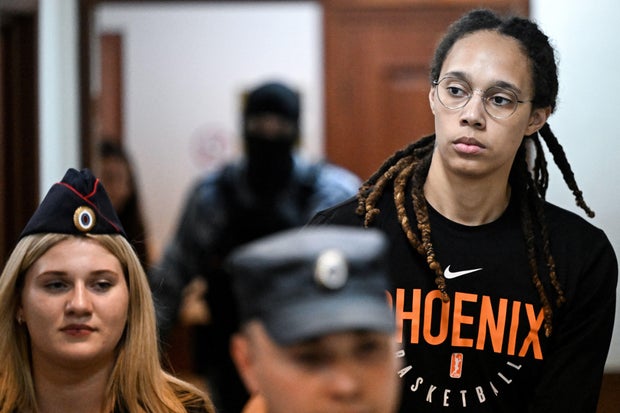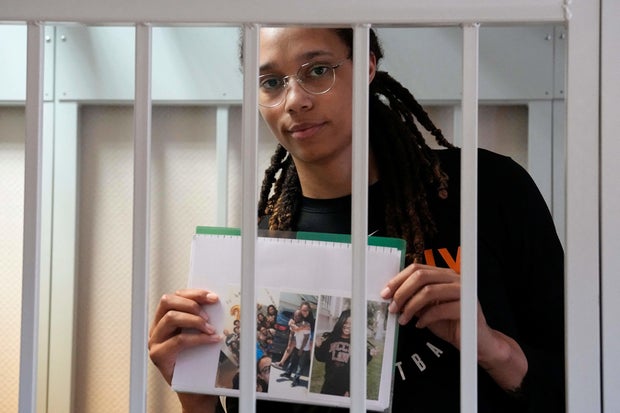WNBA star Brittney Griner testifies at Russia drug trial that interpreter provided incomplete translation during her interrogation
American basketball star Brittney Griner testified Wednesday at her drug trial in Russia that a language interpreter provided during her questioning translated only a fraction of what was said and officials instructed her to sign documents without providing an explanation.
Griner was arrested at a Moscow airport in February. She acknowledged in court earlier this month that she had vape cartridges containing cannabis oil when she arrived in Russia but contends she had no criminal intent and the cartridges ended up in her luggage inadvertently.
KIRILL KUDRYAVTSEV/AFP via Getty Images
During her testimony, the Phoenix Mercury standout described making a grueling 13-hour flight to Moscow from Arizona while recovering from COVID-19. Griner said she still does know how the cannabis oil for which she had a doctor’s recommendation ended up in her bag but explained she had packed in haste while under great stress.
She recalled how her luggage was checked upon her Feb. 17 arrival in Moscow and getting pulled aside after inspectors found the cartridges.
Along with the interpreter who allegedly provided an incomplete translation, Griner said she was offered neither an explanation of her rights nor access to lawyers and was instructed to sign documents without receiving an explanation of what they implied.
After hours of proceedings she did not understand, she was allowed to hand over her personal belongings to a lawyer before being led away in handcuffs, Griner said. She said she received only a cursory translation of the allegations at her during a Feb. 19 hearing where a court sanctioned her arrest.
Griner faces up to 10 years in prison if convicted of transporting drugs. Her trial started July 1. and the five previous court sessions so far were short, some lasting only about an hour.
It is unclear how long the trial will last, but a court has authorized Griner’s detention until Dec. 20. She went to Russia to play for a Russian team in the WNBA’s off-season.
ALEXANDER ZEMLIANICHENKO/POOL/AFP via Getty Images
During Tuesday’s court session of about 90 minutes, a Russian neuropsychologist testified about worldwide use of medicinal cannabis, which remains illegal in Russia. Griner’s defense team has submitted a U.S. doctor’s letter recommending the basketball player use medical cannabis to treat pain.
Griner testified Wednesday that she was suffering from pain from injuries sustained during her basketball career. She emphasized that cannabis oil is widely used in the United States for medicinal purposes and has less negative effects than some other painkillers.
A Russian Foreign Ministry spokesperson said last week that the legalization of cannabis for medical and recreational use in parts of the U.S. had no bearing on what happens in Russia.
The slow-moving trial and Griner’s five months of detention have raised strong criticism among teammates and supporters in the United States, which has formally declared her to be “wrongfully detained,” a designation sharply rejected by Russian officials.
In a handwritten letter from Griner that was delivered to the White House earlier this month, the WNBA player wrote how terrified she is that she may be imprisoned in Russia “forever.”
Griner’s wife Cherelle told “CBS Mornings” that when she read the letter, she could feel the fear that Griner was experiencing.
“She is probably the strongest person that I know, so she doesn’t say words like that lightly. That means she truly is terrified that she may never see us again. You know, I share those same sentiments,” Cherelle said.
Griner was arrested in February amid high U.S.-Moscow tensions ahead of Russia sending troops into Ukraine later that month. Some supporters contend she is being held in Russia as a pawn, possibly for a prisoner swap. American soccer notable Megan Rapinoe last week said “she’s being held as a political prisoner, obviously.”
Russian media have speculated that Griner could be exchanged for prominent Russian arms trader Viktor Bout, who is imprisoned in the United States, and that Paul Whelan, an American imprisoned in Russia for espionage, may also figure in an exchange.
U.S. officials have not commented on the prospects for such a trade. Russian officials have said no exchange could be discussed until the conclusion of the legal proceedings against Griner.
For all the latest World News Click Here
For the latest news and updates, follow us on Google News.



